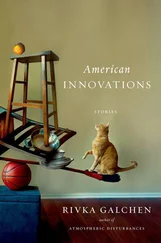It was all brimming over with good intentions, the shopping plan.
That next day I found a heavy coat that I knew would look beautiful on the simulacrum; it was of a pale blue wool, not wholly unlike Rema’s winter coat; I placed the coat in the simulacrum’s arms with assurance. Although it was not a perfect coat, and not exactly like Rema’s, I knew that later we could locate oversized buttons to sew onto it and then it would be spectacular. And meanwhile it could keep her warm.
“Doesn’t interest me,” the simulacrum said, seeming annoyed. “I’d prefer another color. And something more sporty, more like for climbing a little mountain.” She tried on an ugly down jacket, very puffy, emergency yellow, with wide-stitch quilting.
“That would be a mistake,” I said. I tried to explain to her about the buttons that would go on the wool coat and how nice it would look then.
She said it would look just like a wool coat she already had and that I perfectly well knew that. Then she petted at the sleeves of that ugly yellow thing.
Not wanting to cause trouble — she already seemed so short-tempered — I didn’t point out that it wasn’t actually her coat, it was Rema’s, and I wasn’t going to let her just take it. Certainly not for until the end of time. I mean, what I was thinking then was that even if I found Rema, she and I would probably let the simulacrum live with us, at least for a delimited period, if she had no other place to go; we wouldn’t just kick her out on the street. Who knew what her real circumstances might be? And who could say — maybe she and Rema would become good friends, and share clothes, and secrets, and dog-caring duties.
“You look like an alarm in that coat,” I said to her. “Like a hazardous crossing signal.” I carried the finer coat folded over my arm like a sommelier’s napkin, and I followed the simulacrum all over the store as she tried on other unflattering jackets. Politely but firmly I held to my opinions. She steadily disagreed with them.
My pacific nature finally broke. “Why do you care so much?” I said. “Why does it matter to you, one coat or the other? Why can’t you just take a gift graciously?”
The simulacrum looked right through me. A fluorescence above smoldered. “Why do you care so much?” she finally said.
I didn’t respond.
“This is ugly,” she said, looking at me, and I got the sense that she was referring to more than just the coat over my arm. She tried on one more item, traffic cone orange and far too large. “All right, this is it.”
I quietly pointed out to her that the fabric looked like it was made from recycled tires.
“It pleases me,” she said. “It’s impregnable.”
“But the color. I mean, maybe if you didn’t dye your hair blonde. Maybe for a brunette, this color, but—”
Then — and there was a sweet bitterness in her speech, a bitterness like licorice pills: “Which do you think your friend Tzvi GalChen would prefer?” She tilted her head. And this made me think of that night nurse laughing at me, and of that dog-walking analyst, and the way he had smiled at me that day, a laughing kind of smile, and even of Anatole I thought, and even of fireworks, and also I thought of me, of my unwanted laughter too.
“Why, which do you think he’d prefer?” I said back to her. She’d ruined the whole fun of everything, had reduced me to echoing.
“Can you not get him on the phone anymore? Poor thing. Although now that I am thinking,” she said, “maybe he’s not the person I would ask for fashion advice.”
17. Attacks on the local steady-state hypothesis
That afternoon, Harvey approached the simulacrum and me with plans for going for “a constitutional.” I agreed, but then the simulacrum backed out, saying she’d rather stay behind preparing for tomorrow’s meeting, reading the research of Tzvi Gal-Chen. Her withdrawal seemed a kind of threat. But only kind of. At the time, I suspected nothing.
A few blocks out in that chill and Harvey ventured, “I’m concerned about the reality of Tzvi Gal-Chen.”
“You’re telling me that you’re concerned about the reality of Tzvi Gal-Chen?”
“No, about the health of Tzvi Gal-Chen,” he said into the wind.
“About the health of Tzvi Gal-Chen?” I said.
“No. About the modality of Tzvi Gal-Chen,” he said. “About the modality.”
“The reality,” I said. “That is what you are saying?”
“Yes,” he said.
“This is about the out-of-office reply? I got that too, and it distressed me, but I can’t imagine it’s anything serious.”
“Out-of-office? What? No. My concern pertains to what the blonde told me.”
I tried to think if I had earlier noticed him referring to the simulacrum as “the blonde.” Instead sheep and fruit came to mind.
Harvey went on: “She told me that there is no Tzvi Gal-Chen. Not really. Not in any real sense like I thought there was. And then she said this. She said that if there was a Tzvi Gal-Chen, then you may as well say that she is Tzvi Gal-Chen. That’s what she said to me. A bit arrogant, no?”
I heard a tremendous cracking sound: somewhere ice breaking. We had been told that chunks of glacier often fell, crashing into the lake. “Did you see that sound?” I asked.
“You’re resistant to this information, Dr. Leo. All I’m saying is: do we really know who she is?”
I thought of the simulacrum walking out on that military man at the ice-cream shop, and I felt that pang of heartburn that I associate with, well, love. “She is someone, I suppose,” I said. “Or not even suppose, but most likely. Obviously. Of course.” And I did keep hearing ice cracking, sometimes even shattering. Off at a distance, but it made me feel unsteady. “Listen, Harvey — I think I know why she says she’s Tzvi Gal-Chen. But it’s a stupid thing that makes her say so, a very stupid thing, Harvey, and I don’t want you to take the things she says very seriously. She is not a reliable source. Her data is shot through with error. Maybe blue noise, error on the smallest scale, but error nonetheless. Any data from her must be filtered—”
“But it’s an interesting problem that she brings up, the problem of knowing Tzvi Gal-Chen. It’s a problem that sounds epistemic but that may in fact be metaphysical.”
“Which analyst used that phrase with you?”
“Doesn’t it accurately describe the situation?”
“No. He’s just out of his office. Being out — that’s a totally normal thing that people can be. He’ll return. And until then we know we have our meeting tomorrow. Don’t get nervous over this. After all, how could Tzvi Gal-Chen not be real if you’ve been writing to him? If he has been writing to you? If he has been writing papers in journals since before either of us even knew him and since before the simulacrum was even born?”
“But he hasn’t written any papers very recently; I even asked him about that, and he admitted that no, he had not. He’s gone underground. But why—”
“Yes, well,” I said, “the secret nature of some of the work? That’s not something you don’t understand.” A cold, dry wind burned my cheek like a sunburn, or a slap. As I said those words that didn’t quite convince me of anything, I was reminded of a conversation I’d once had shortly after my mother died in which I referred to my mother in the present tense. I said, “She works as a seamstress.” But I should have said, “She worked as a seamstress.” It was a pretty girl’s question I said that in response to and this was during a time in my life when I had difficulties, much greater difficulties than now, talking to girls. Back then I had difficulties talking to anybody, really. Regardless, the girl said back to me, after touching my wrist, oh, will you ask your mother a question for me? Will you ask her if you can serge without a special machine that’s just for serging? (For me the word “serge” heaved with sexuality.) My present-tense slipup grew increasingly problematic, because every time this girl saw me — she really was so pretty — she would ask me again if I’d talked to my mother, if I’d asked her about the serging. I suppose I could have tried to learn about serging on my own and just lied and said I’d asked my mother. Or I could have simply confessed to the fact that my mother was dead and that I therefore could not ask her about serging. But I did neither of those things; instead I worked harder and harder to avoid the girl, who grew lovelier every year (until at the very end of college she cut her hair short), and when I would spy her, at a distance, or in the cafeteria, I would feel a pressing at the walls of my heart, as if I were in love with this girl whom I didn’t know, as if we might have been the happiest couple there ever was save for how I had ruined everything through my simple slip in language.
Читать дальше
Конец ознакомительного отрывка
Купить книгу












